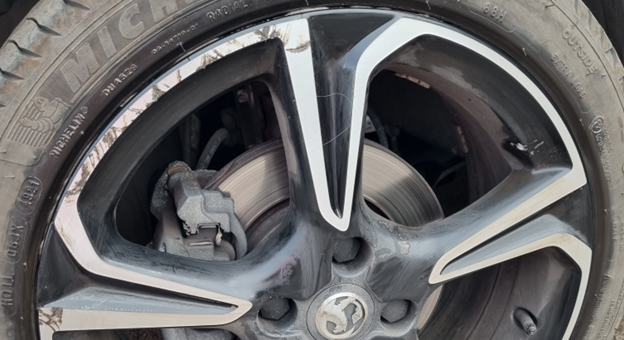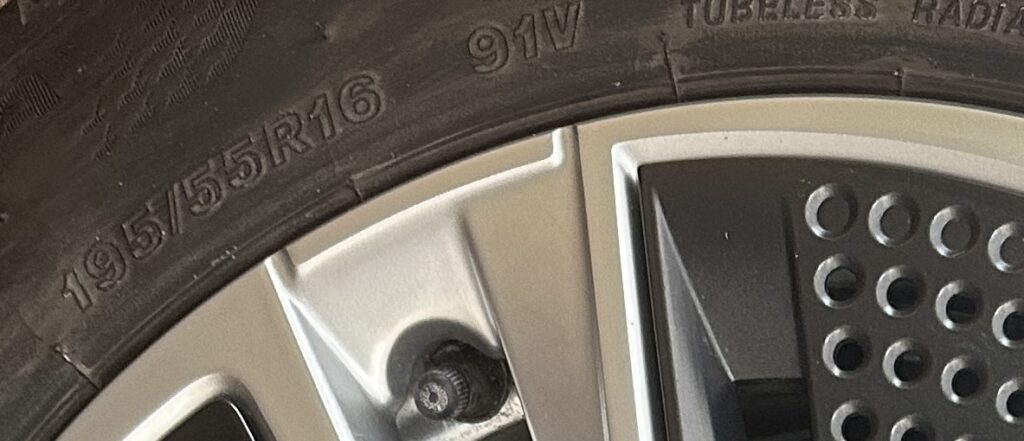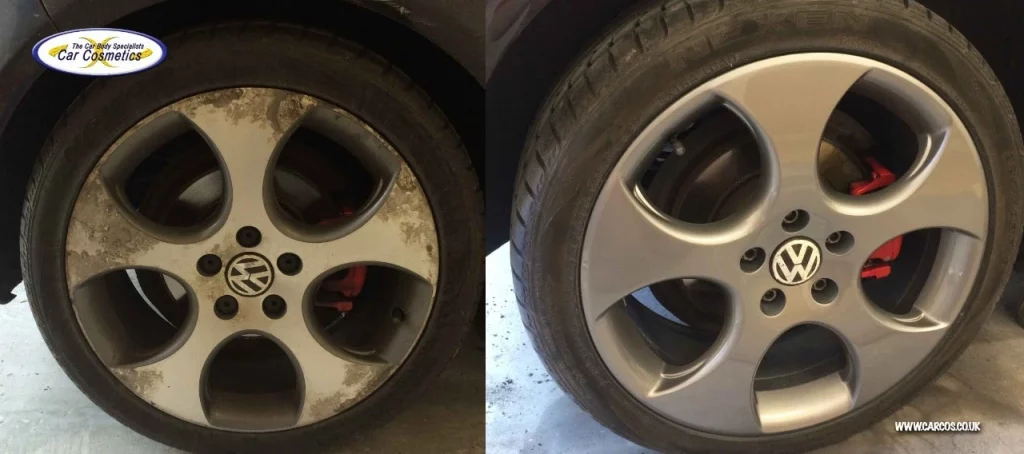Alloy wheels are a hallmark of modern automotive design, featured on most new car models from leading manufacturers such as Ford, Honda, Nissan, BMW, Audi, Porsche, and Mercedes-Benz. Many of these brands also offer diamond-cut alloy wheels, which provide a premium, polished finish that enhances a vehicle’s aesthetic appeal. However, alloy wheels, whether standard or diamond-cut, are prone to damage from everyday driving conditions, including kerb scrapes, potholes, and exposure to harsh weather. Over time, these factors can lead to scuffs, scratches, and corrosion, necessitating professional refurbishment or repair services.
Table of Contents
ToggleAt Car Cosmetic, a provider of alloy wheel refurbishment services in the UK, we leverage industry-standard techniques and certified processes to restore your wheels to their original condition. This comprehensive guide explores the essentials of alloy wheel refurbishment, addressing key questions such as whether to choose refurbishment or repair, the time required, the feasibility of multiple refurbishments, and the associated costs. Backed by scientific principles and certified methodologies, this guide aims to equip UK drivers with the knowledge needed to maintain their alloy wheels effectively.

Materials Used in Alloy Wheels
Alloy wheels are primarily made from combinations of metals, with aluminium and magnesium being the most common base materials. These alloys are blended with other elements to enhance specific properties, such as strength, durability, weight, and corrosion resistance. Below, we explore the different materials used in alloy wheels, how they compare, and their impact on cost, drawing on insights from materials science and automotive engineering.
Aluminium Alloys
Composition: Aluminium alloys are the most widely used material for alloy wheels, typically consisting of aluminium combined with small percentages of elements like silicon, magnesium, copper, or zinc. Common aluminium alloys include the 6000 series (e.g., 6061, which contains magnesium and silicon) and the 7000 series (e.g., 7075, which includes zinc for added strength).
Properties:
- Lightweight: Aluminium alloys have a density of approximately 2.7 g/cm³, significantly lighter than steel (7.8 g/cm³), reducing unsprung weight and improving fuel efficiency and handling (Materials Science and Engineering, Vol. 527, 2010).
- Corrosion Resistance: Aluminium naturally forms a protective oxide layer, making it highly resistant to rust and corrosion, ideal for the UK’s wet and salty road conditions.
- Strength-to-Weight Ratio: Offers a balance of strength and weight, suitable for both standard and performance vehicles.
- Aesthetic Versatility: Aluminium alloys can be easily machined, painted, or polished, making them ideal for a variety of finishes, including diamond-cut.
Cost: Aluminium alloy wheels are the most cost-effective option, with prices ranging from £100 to £500 per wheel for standard models, depending on size, brand, and finish. Refurbishment costs for aluminium alloy wheels typically range from £80 to £120 per wheel for standard finishes and £120 to £150 for diamond-cut finishes, as noted by the Retail Motor Industry Federation (2023).
Applications: Found in most passenger vehicles from brands like Ford, Honda, Nissan, and BMW, aluminium alloys are the go-to choice for their balance of performance, durability, and affordability.
Magnesium Alloys
Composition: Magnesium alloys, often referred to as “mag wheels,” are made from magnesium combined with elements like aluminium, zinc, or rare earth metals to enhance strength and corrosion resistance. Common magnesium alloys include AZ91 (magnesium with aluminium and zinc) and WE43 (magnesium with rare earth elements).
Properties:
- Ultra-Lightweight: With a density of approximately 1.8 g/cm³, magnesium alloys are lighter than aluminium, offering superior weight reduction for high-performance vehicles.
- High Strength: Magnesium alloys provide excellent strength, particularly in forged wheels, but are more brittle than aluminium, making them prone to cracking under severe impact.
- Corrosion Susceptibility: Magnesium is less corrosion-resistant than aluminium and requires robust protective coatings to withstand environmental exposure, especially in the UK’s harsh climate (Corrosion Science, Vol. 94, 2015).
- Heat Dissipation: Magnesium alloys excel at dissipating heat, making them ideal for high-performance vehicles with intense braking demands.
Cost: Magnesium alloy wheels are significantly more expensive, with prices ranging from £500 to £2,000 per wheel, depending on the manufacturing process (cast or forged) and brand (e.g., Porsche or aftermarket brands like BBS). Refurbishment costs are higher, typically £150 to £250 per wheel, due to the need for specialised coatings and handling to prevent corrosion.
Applications: Primarily used in high-performance and luxury vehicles, such as those from Porsche or motorsport applications, where weight reduction is critical. Their higher cost and maintenance requirements make them less common in everyday vehicles.
Aluminium-Magnesium Hybrids
Composition: Some alloy wheels combine aluminium and magnesium to balance cost, weight, and durability. These hybrid alloys typically contain a higher proportion of aluminium with small amounts of magnesium to enhance strength.
Properties:
- Balanced Weight and Strength: These alloys offer a compromise between the lightweight properties of magnesium and the durability of aluminium, making them suitable for mid-range performance vehicles.
- Moderate Corrosion Resistance: While not as corrosion-resistant as pure aluminium alloys, hybrid alloys perform well with proper coatings.
- Cost-Effective Performance: Hybrid alloys provide performance benefits similar to magnesium at a lower cost, making them a popular choice for mid-tier vehicles.
Cost: Hybrid alloy wheels typically cost £200 to £800 per wheel, depending on the specific alloy composition and finish. Refurbishment costs align closely with aluminium alloys, ranging from £90 to £140 per wheel for standard finishes and £130 to £180 for diamond-cut finishes.
Applications: Common in mid-range performance vehicles from brands like Audi and Mercedes-Benz, where cost and performance are balanced.
Comparison of Materials
| Material | Weight | Strength | Corrosion Resistance | Cost (Per Wheel) | Refurbishment Cost |
|---|---|---|---|---|---|
| Aluminium Alloy | Moderate | High | Excellent | £100–£500 | £80–£150 |
| Magnesium Alloy | Very Light | High | Moderate (requires coatings) | £500–£2,000 | £150–£250 |
| Aluminium-Magnesium Hybrid | Light | High | Good | £200–£800 | £90–£180 |
Key Considerations:
- Performance vs. Cost: Aluminium alloys are the most cost-effective and widely used, offering a balance of performance and affordability. Magnesium alloys are ideal for high-performance applications but come with higher costs and maintenance needs.
- Durability: Aluminium alloys are more durable in everyday driving conditions due to their superior corrosion resistance. Magnesium alloys require meticulous care to prevent corrosion, particularly in the UK’s wet climate.
- Refurbishment Complexity: Magnesium alloy wheels are more challenging to refurbish due to their susceptibility to corrosion and brittleness, requiring specialised techniques. Aluminium and hybrid alloys are easier to refurbish, making them more cost-effective for long-term maintenance.
At Car Cosmetic, our certified technicians are experienced in handling all alloy types, ensuring tailored refurbishment processes that account for the unique properties of each material. For example, magnesium alloy wheels receive additional anti-corrosion treatments, while aluminium alloys are treated with precision to maintain their aesthetic and structural integrity.
OEM Alloy Wheels
Definition: OEM alloy wheels are designed and manufactured by the vehicle’s original manufacturer (e.g., Ford, BMW, Audi) or their approved suppliers. These wheels are specifically engineered to meet the vehicle’s performance, safety, and aesthetic requirements.
Characteristics:
- Quality and Standards: OEM wheels adhere to strict quality and safety standards, such as those set by the Vehicle Certification Agency (VCA). They undergo rigorous testing to ensure compatibility with the vehicle’s suspension, braking system, and overall design.
- Material and Finish: Typically made from high-quality aluminium or aluminium-magnesium hybrid alloys, OEM wheels often feature premium finishes, such as diamond-cut or polished surfaces, tailored to the vehicle’s brand aesthetic.
- Fitment: OEM wheels are designed for perfect fitment, ensuring optimal performance, balance, and handling without requiring modifications.
- Warranty and Support: OEM wheels often come with manufacturer warranties, and replacement parts are readily available through authorized dealerships.
- Cost: OEM wheels are generally more expensive, ranging from £200 to £1,000 per wheel, depending on the brand, size, and finish. Refurbishment costs align with standard aluminium or hybrid alloy wheels (£80–£150 per wheel), though diamond-cut OEM wheels may cost £120–£180 due to their precision finishes.
Advantages:
- Guaranteed compatibility with the vehicle’s specifications.
- High-quality materials and finishes, ensuring durability and aesthetic consistency.
- Backed by manufacturer warranties and support.
Disadvantages:
- Higher initial cost compared to aftermarket options.
- Limited design variety, as OEM wheels are designed to match the vehicle’s original aesthetic.
Applications: OEM alloy wheels are standard on most new vehicles from manufacturers like Honda, Nissan, BMW, and Mercedes-Benz. They are ideal for drivers prioritizing reliability, safety, and brand consistency.
Aftermarket Alloy Wheels
Definition: Aftermarket alloy wheels are produced by third-party manufacturers (e.g., BBS, OZ Racing, or TSW) and are not affiliated with the vehicle’s original manufacturer. These wheels are designed to fit a wide range of vehicles and offer greater customization options.
Characteristics:
- Quality Variability: Aftermarket wheels vary widely in quality, depending on the manufacturer. Reputable brands like BBS adhere to high standards, while lower-end aftermarket wheels may not meet OEM safety or durability requirements.
- Material and Finish: Aftermarket wheels are typically made from aluminium alloys, with some high-end models using magnesium or hybrid alloys. They offer a broader range of finishes, including custom colors, matte, or gloss, and unique designs not available in OEM options.
- Fitment: Aftermarket wheels may require adapters, spacers, or modifications to ensure proper fitment, which can affect vehicle handling or safety if not installed correctly.
- Cost: Aftermarket wheels range from £50 to £2,000 per wheel, depending on the brand, material, and design. Budget aftermarket wheels are significantly cheaper than OEM, but premium aftermarket wheels (e.g., forged magnesium) can be more expensive. Refurbishment costs are similar to OEM wheels (£80–£250 per wheel), depending on the material and finish.
- Customization: Aftermarket wheels offer greater flexibility in size, style, and finish, allowing drivers to personalize their vehicle’s appearance.
Advantages:
- Wide variety of designs, sizes, and finishes for customization.
- Potentially lower cost for budget-friendly options.
- Availability from multiple manufacturers, offering more choices.
Disadvantages:
- Quality varies, with some budget options prone to premature wear or structural issues.
- Potential fitment issues, requiring professional installation to ensure safety.
- Limited or no manufacturer warranty compared to OEM wheels.
Applications: Aftermarket alloy wheels are popular among car enthusiasts and drivers seeking to customize their vehicles. They are commonly used for aesthetic upgrades, performance modifications, or cost savings compared to OEM replacements.
OEM vs. Aftermarket: Key Differences
| Aspect | OEM Alloy Wheels | Aftermarket Alloy Wheels |
|---|---|---|
| Manufacturer | Vehicle manufacturer or approved supplier | Third-party manufacturers |
| Quality | Consistently high, meets strict standards | Varies, from budget to premium quality |
| Fitment | Perfect fit for specific vehicle models | May require modifications or adapters |
| Material | Aluminium or hybrid alloys | Aluminium, magnesium, or hybrid alloys |
| Cost (Per Wheel) | £200–£1,000 | £50–£2,000 |
| Refurbishment Cost | £80–£180 | £80–£250 |
| Customization | Limited to manufacturer designs | Wide variety of designs and finishes |
| Warranty | Manufacturer-backed warranty | Varies, often limited or none |
Refurbishment Considerations:
- OEM Wheels: Refurbishing OEM wheels requires adherence to manufacturer specifications to maintain their original appearance and performance. Diamond-cut OEM wheels, common on luxury brands, require specialized CNC machining, increasing refurbishment costs.
- Aftermarket Wheels: Refurbishment may be more complex due to the variety of designs and finishes. Budget aftermarket wheels may have thinner coatings, requiring extra care to avoid excessive material removal during refurbishment. Premium aftermarket wheels, such as those made from magnesium, demand specialized anti-corrosion treatments.
At Car Cosmetic, our certified technicians are equipped to refurbish both OEM and aftermarket alloy wheels, ensuring high-quality results tailored to the wheel’s material, finish, and design. We assess each wheel’s specifications to recommend the most suitable refurbishment process, preserving its aesthetic and structural integrity.
Understanding Alloy Wheel Refurbishment
Alloy wheels, typically made from aluminium or magnesium alloys, are valued for their lightweight properties, corrosion resistance, and aesthetic versatility. According to a study published in Materials Science and Engineering (Vol. 527, 2010), aluminium alloys used in automotive wheels offer a superior strength-to-weight ratio compared to traditional steel wheels, making them ideal for improving fuel efficiency and handling. However, their surface is susceptible to cosmetic and structural damage, necessitating refurbishment or repair.
Alloy wheel refurbishment involves restoring the wheel’s appearance by addressing surface-level damage, such as scuffs, scratches, and minor corrosion, through a series of certified processes. These processes, often adhering to standards set by organisations like the British Standards Institution (BSI), ensure durability and safety. At Car Cosmetic, our refurbishment services are performed by technicians certified to UK industry standards, ensuring compliance with best practices.
Should You Opt for Refurbishment or Repair?
Choosing between alloy wheel refurbishment and repair depends on the nature and extent of the damage. A 2018 technical note from the Journal of Automotive Engineering highlights that cosmetic damage, such as scratches and scuffs, can often be addressed through refurbishment without compromising the wheel’s structural integrity, while structural damage, such as cracks or bends, requires repair to ensure safety.
- Refurbishment: Perfect for revitalizing wheels with cosmetic imperfections, refurbishment involves stripping the wheel’s surface, cleaning, sanding, priming, repainting, and applying a protective lacquer. This comprehensive process starts anew to restore the wheel’s appearance, particularly for standard or diamond-cut alloy wheels, and guards against corrosion. Certified by the UK’s Vehicle Certification Agency (VCA), refurbishment ensures a durable, flawless finish while preserving surface integrity.
- Repair: Primarily focused on fixing scuffing, such as scratches or abrasions, to restore the wheel’s look and functionality. Repairs can also address structural damage like cracks, which may affect balance and safety, using targeted techniques like sanding, filling, or welding. Performed by certified technicians with specialized equipment, repairs adhere to strict UK safety standards to ensure reliability for both standard and diamond-cut wheels.
At Car Cosmetic, our certified technicians conduct a thorough inspection using diagnostic tools to assess whether refurbishment or repair is the most suitable option. For minor damage, refurbishment is typically recommended, as it is more cost-effective and preserves the wheel’s original properties.

How Long Does Alloy Wheel Refurbishment Take?
The duration of alloy wheel refurbishment depends on the wheel’s condition, size, and the specific process used. A standard refurbishment, as outlined in industry guidelines from the Society of Motor Manufacturers and Traders (SMMT), typically includes:
- Cleaning: Using pH-neutral cleaners to remove dirt, brake dust, and contaminants.
- Surface Preparation: Sanding and filling minor scratches and scuffs to create a smooth surface.
- Priming and Painting: Applying a primer, base coat, and protective lacquer, often using computer-matched paints for precision.
- Curing: Allowing the paint and lacquer to set, typically using heat or UV curing for durability.
For a single wheel with minor damage, a certified refurbishment can be completed in 1 to 2 hours. However, more complex cases, such as wheels with significant corrosion or diamond-cut finishes, may require additional steps, such as chemical stripping or precision machining. According to a technical report by the Institute of Materials, Minerals and Mining (2020), diamond-cut wheel refurbishment can take up to 6 to 36 hours, depending on the extent of damage and the need for specialised equipment.
At Car Cosmetic, we use state-of-the-art facilities and certified processes to ensure efficient turnaround times without compromising quality. Most refurbishments are completed within a day, allowing you to get back on the road quickly.
Is Multiple Refurbishments Safe for Alloy Wheels?
A common concern among UK drivers is whether alloy wheels can be refurbished multiple times without compromising their integrity. According to a study in Corrosion Science (Vol. 94, 2015), repeated removal of surface material during refurbishment can reduce the thickness of the wheel’s protective coating, potentially increasing susceptibility to corrosion. However, when performed by certified professionals using controlled techniques, multiple refurbishments are generally safe.
At Car Cosmetic, we advise against frequent refurbishments, such as monthly services, as they can weaken the wheel’s surface over time. Instead, refurbishment should be performed only when necessary, such as after a minor kerb scrape or when minor corrosion is detected. Our YouTube channel features videos demonstrating the stunning results of a single, high-quality refurbishment, showcasing how proper care can maintain your wheels’ appearance and durability. If your wheels have been refurbished multiple times, our certified technicians can assess their condition to ensure they remain safe for use.

What Are the Costs of Alloy Wheel Refurbishment in the UK?
The cost of alloy wheel refurbishment in the UK varies based on wheel size, damage extent, and finish type. According to industry data from the Retail Motor Industry Federation (2023), typical costs for certified refurbishment services are as follows:
- Standard Alloy Wheels (up to 20 inches): Refurbishment costs £80 to £100 per wheel, covering cleaning, minor repairs, and a standard finish.
- Larger Alloy Wheels (21 inches or more): Due to increased material and labour requirements, costs range from £100 to £120 per wheel.
- Diamond-Cut Alloy Wheels: These require specialised CNC machining and certified processes, with costs ranging from £120 to £150 per wheel.
- Full Set of Four Wheels: Many providers offer discounts for refurbishing all four wheels simultaneously. A set of 20-inch wheels typically costs £300 to £360, while larger or diamond-cut wheels may cost £400 to £500 for a full set.
These prices reflect certified services that adhere to UK safety and quality standards. At Car Cosmetic, we offer competitive pricing and transparent quotes tailored to your vehicle’s needs. For precise costs, contact us or visit our website.
The Importance of Professional Alloy Wheel Refurbishment
Certified alloy wheel refurbishment offers numerous benefits beyond aesthetics. According to a 2019 report by the Transport Research Laboratory, well-maintained wheels contribute to vehicle safety by ensuring proper balance and reducing the risk of tyre-related issues. Professional refurbishment also:
- Enhances Aesthetics: Restores or customises the wheel’s appearance to match your vehicle’s style.
- Prevents Further Damage: Protective coatings applied during refurbishment guard against corrosion, particularly in the UK’s wet and salty road conditions.
- Boosts Resale Value: Well-maintained wheels signal to buyers that the vehicle has been cared for, increasing its market value.
- Ensures Safety: Addressing damage promptly prevents issues like air leaks or structural weaknesses that could compromise driving safety.

Selecting a Certified Service Provider
Choosing a certified service provider is critical to ensuring high-quality results and compliance with UK safety standards. Consider the following when selecting a provider:
- Certifications: Look for providers certified by bodies like the VCA or SMMT, ensuring adherence to industry standards.
- Customer Reviews: Check platforms like Trustpilot or Google Reviews for feedback on quality and reliability.
- Specialisation: Ensure the provider has experience with your wheel type, particularly for diamond-cut alloys.
- Warranty: Reputable providers offer warranties (typically 6–12 months) on their work, covering issues like peeling or fading.
At Car Cosmetic, our certified technicians use advanced equipment and adhere to BSI standards, ensuring exceptional results for all alloy wheel types.
Maintenance Tips for Alloy Wheels
To prolong the life of your refurbished wheels, follow these scientifically backed tips:
- Regular Cleaning: Use pH-neutral cleaners to remove brake dust and contaminants, as acidic cleaners can damage protective coatings (Journal of Surface Science, 2017).
- Avoid Kerb Damage: Park carefully and consider wheel protectors to prevent scrapes.
- Inspect Regularly: Check for early signs of damage to address issues before they worsen.
- Apply Sealants: Use wheel-specific sealants to protect against corrosion, especially in winter.
Conclusion
Alloy wheel refurbishment is a vital service for UK drivers seeking to maintain their vehicle’s appearance, safety, and value. By choosing certified professionals and understanding the process, costs, and maintenance requirements, you can keep your wheels in pristine condition. At Car Cosmetic, we combine certified techniques, state-of-the-art equipment, and a commitment to customer satisfaction to deliver outstanding results. Visit our website or contact us today to learn more about our services and how we can restore your alloy wheels to their full potential.
Frequently Asked questions (FAQ)
What is the difference between alloy wheel refurbishment and repair?
Refurbishment means that it has been restored to a like-new condition by the manufacturer or a professional service, by removing all paint to metal and rebuilding back up. and repair means to just fix the damaged cause of kerbing usually on the front side only.
Can all alloy wheels be refurbished?
Most alloy wheels, including standard and diamond-cut, can be refurbished. However, severely damaged wheels (e.g., with deep cracks or buckles) may require replacement. A certified technician can evaluate suitability, per VCA standards.
Are diamond-cut wheels harder to refurbish?
Yes, diamond-cut alloy wheel refurbishment require specialised CNC machining to restore their precise finish, making the process more complex and costly (£145–£195 per wheel) Less on sets of 4. Certified providers ensure accurate results.
Will alloy wheel refurbishment affect my wheel’s balance?
When performed by certified professionals, refurbishment does not affect wheel balance. Technicians ensure proper alignment and may rebalance tyres post-refurbishment, per SMMT guidelines.
How do I maintain my refurbished wheels?
Clean weekly with pH-neutral cleaners, avoid kerb damage, inspect regularly, and apply a wheel sealant to protect against corrosion, especially in winter.
Legal Stuff
Car Cosmetics (www.carcos.co.uk) proudly complies with all relevant UK regulations, ensuring our alloy wheel refurbishment services meet the highest standards of consumer protection, data privacy, and industry compliance. We strictly adhere to the General Data Protection Regulation (GDPR), UK consumer rights laws, and automotive industry standards to provide safe, reliable, and transparent services. Our commitment to legal and ethical practices underpins every aspect of our operations, from customer interactions to data handling.
To maintain transparency, we provide detailed Terms and Conditions and a Privacy Policy on our website, which outline your rights, our responsibilities, and how we safeguard your personal information. These documents are designed to give you confidence in our processes and commitment to compliance. We encourage all customers and visitors to review these policies to fully understand our obligations and the protections in place for you. By choosing Car Cosmetics, you’re partnering with a business dedicated to delivering exceptional, compliant car cosmetic solutions tailored to your needs. Visit www.carcos.co.uk to explore our services, learn more about our policies, and see how we prioritise your trust and satisfaction in every interaction.
